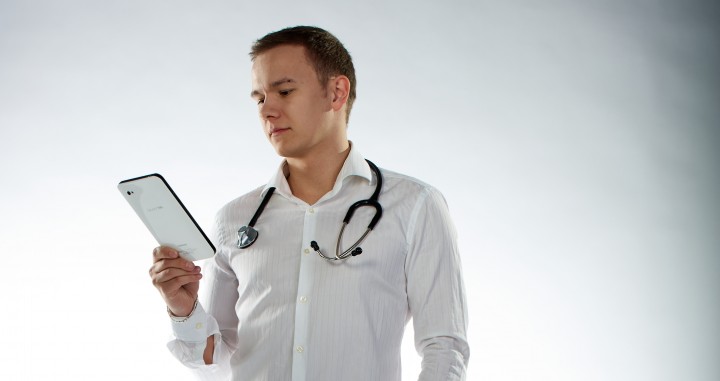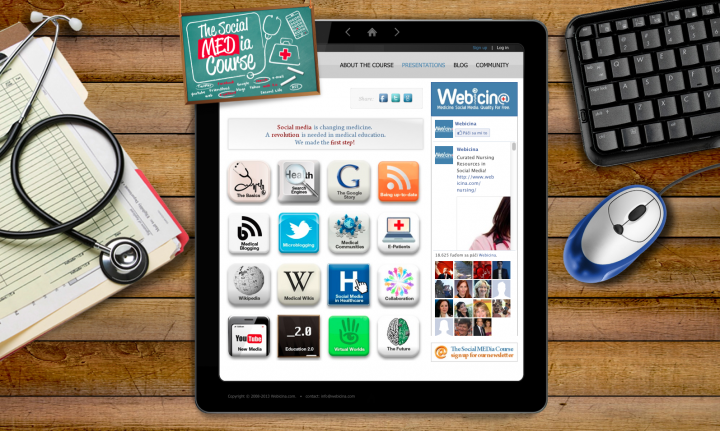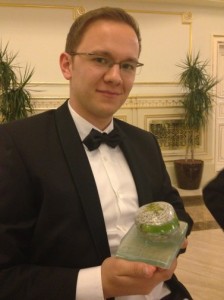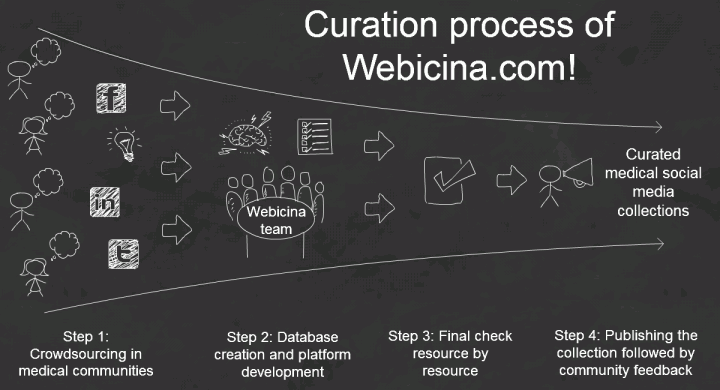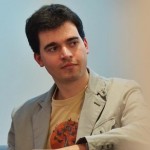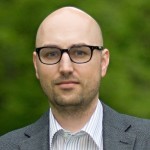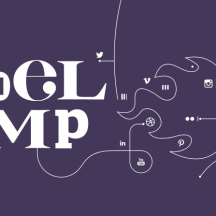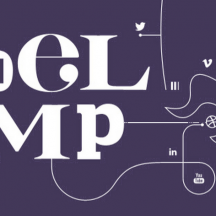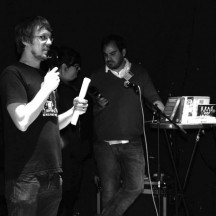Social media appears to be a tool mostly for journalists and marketers. Dr. Bertalan Meskó is making a difference in one of the less expected fields. Medicine. He founded Webicina, a curated social media resources website, and started the first online course focusing on social media and medicine. Besides his story, he gives many tips valuable for all of us concerned with social media.
At the TEDxYouthBp speech last summer you told the audience that you remember the first day you went online and the first site you visited. What was it?
It was the website of the upcoming Winter Olympic Games in Nagano. It took me several hours to find out how to go online and when I succeeded, I typed the first URL that came to my mind.
Do you think this early age experience got you that curious for the internet?
My love for technology began far before with an AMIGA machine. I’ve always been a geek, therefore using the Internet was quite an evident step for me.
A few of your talks (TEDxNijmegen and Doctor 2.0) are available online and you always start off saying you are a geek. How come you turned out to be a doctor, when you clearly have been obsessed with “geeky” stuff in your earlier age?
I’ve had two obsessions: science and technology. As from the age of 6, I wanted to become a geneticist doctor, I went to medical school and then finished my PhD in this field. Although, as I was a geek before I became a doctor, it changed my path later on.
Where did you get the idea to connect medicine and social media? Doctors aren’t exactly known for their computer literacy skills.
I came across a slideshow about using the Internet in medicine published by Ves Dimov, MD in 2006. I sent him an e-mail asking some questions and he kindly sent me another presentation of his. I think that was the initiator for additional thoughts. From that point, I started working on digital solutions for doctors and patients. I learnt more and more about this field and started giving presentations to local clinics about the opportunities.
You say “Digital literacy must be in the medical curriculum!” When we look at the European healthcare professionals on the Social Web: Self-service directory, we see that there are only a few active professionals in Europe. How do you explain that?
These two observations are not relevant. As the number of e-patients is growing and there is a larger need for new skills related to the digital world for doctors, I thought teaching such skills should be in the medical curriculum, therefore I launched the world’s first university course accompanied by an e-learning platform as well.
Regarding your second point, the number of web-savvy doctors is rising slowly. This is one of the reasons why I think it’s my mission to help them embrace the digital world.
When you compare the countries in central and eastern Europe, who is doing the best job to keep up to date with social media in healthcare? Or, is there any country in the world from whom we should be inspired?
Most people in the field work in the US and I would say, based on my experiences, there are sporadic examples worldwide. There are no exceptional countries or regions. The success of social media and other digital strategies always depend on the right people with the right skills and knowledge; and their openness for innovation.
So, the social media world is dominated by US based professionals. It is quite uncommon to meet people from Central Europe who made it big. From your experience, was it a disadvantage or on the contrary – a bit of exotic charm that actually helped you to stand out from the rest?
Actually, both. In most cases, it’s a disadvantage as people in Western-European and North-American countries don’t always know about your country which makes your position more complicated, but on the contrary, in many cases it proved to be an advantage as challenging situations can make you innovate more. Moreover, as this is a small country, I could launch pilot projects which turned out to be very successful. To sum it up, as I love challenge, I’ve been enjoying the lack of limitations provided by the Internet.
I like what you once said “same rules apply for real life as for the internet”. I once attended a seminar (it was 6 years ago when studying medicine), where our teacher explained to us that he has patients from all around the world and they communicate via Skype. He was the only doctor who knew more about technology than me. What do you think should be the motivation for doctors? And is there a possibility to get older doctors interested?
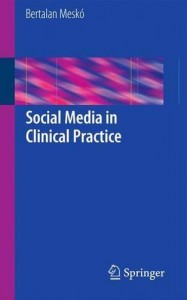 I don’t think all doctors must become technology-savvy and start a Twitter account, but I tell my students they have to at least know about the potential solutions and the limitations as well. And it’s not an age issue. Older doctors, in my experience, would love to use the solutions I show them but they face the lack of digital skills; while younger docs have been innate digital users but use the technology for personal reasons.
I don’t think all doctors must become technology-savvy and start a Twitter account, but I tell my students they have to at least know about the potential solutions and the limitations as well. And it’s not an age issue. Older doctors, in my experience, would love to use the solutions I show them but they face the lack of digital skills; while younger docs have been innate digital users but use the technology for personal reasons.
Both groups can be transformed through practical examples and step by step guides. This is why I wrote a handbook about using social media in the clinical practice.
Looking back, what was the best thing you did to build up your social presence as a doctor? Was it intentional?
The best thing was building my networks every single day for the last 8-9 years. It requires commitment and strategy. I constantly evaluate my strategy even now that I have hundreds of thousands of followers in social media. Of course, one must have an openness to sharing information, I call it mental exhibitionism, but the most part is about the strategy you choose.
With medical information it is always their quality which is in question. You said “social media must be curated” and also that you “really believe in the power of HONcode.” How do you feel about the current situation in the field of evaluation and certification of health information on the Internet?
Sites like HONcode have been evaluating medical websites for many years, but as more and more people start searching social media for medical information, Webicina.com, which just won the Gran Prize Innovative Interdisciplinary Award by the Swedish Chamber of Commerce, has its momentum. We curate medical social media resources in 140 topics and 20 languages for patients and medical professionals for free.
Curation is very popular nowadays, due to the huge information overload. Do you have any tips on how to make it work properly?
You need people with excellent skills in this area and you need thousands of hours of innovation to make it happen in practice. We have been doing the curation for 5 years and even the global e-health report of the World Health Organization featured us. It means we have to be proficient at assessing the quality of medical resources on many platforms of social media.
You have initiated the Open access social media guide for pharma to promote and facilitate the integration of social media into healthcare. Do you plan to reach out with this project to those responsible at national or international levels and encourage them to take a proactive approach?
I’ve already done. The European Medicines Agency confirmed to me that they would not deal with social media now which makes the use of Internet in medicine and healthcare really complicated in Europe. We keep working hard to provide stakeholders of this field with useful guides.
Two blogs and 5 million readers, curation of Webicina, an ongoing digital literacy course and constant appearances as a speaker at conferences, how do you find time to manage all this? What are your time-management secrets?
This is a key skillset I’ve been developing for at least a decade now. One Google Document is my HQ where I use color codes and different scales to know which project I should focus on now, tomorrow, this week and this month. I constantly evaluate the strategy I have in mind. The secret is hard work and commitment to the causes I work on all the time.
In the media you are known as Dr. Twitter or Dr. House on Twitter. Is Twitter you favourite social media?
Twitter is my fastest communication channel with over 31,000 (mostly medical) followers which I can use now for crowdsourcing really hard questions as I know my community. If I had all these experts in one room, I would not use the Internet. Therefore the key is knowing these people in a professional way, the platform does not matter that much. They come and go. But real professional human connections last far longer.
This interview was prepared by Tomáš Pruša (@prusatomas) and Dávid Tvrdoň (@davidtvrdon).
